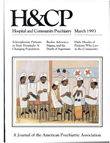Characteristics of Emergency Room Patients That Predict Hospitalization or Disposition to Alternative Treatments
Abstract
Objective: The purpose of the study was to identify variables that predicted three different dispositions of patients seen in a psychiatric emergency room: hospitalization, an emergency housing program, and an outpatient crisis program. Methods: Social, psychiatric, demographic, and vocational characteristics of 50 patients in each dispostion group were examined to learn whether they varied sufficiently to explain the different dispositions. Results: Patients in the hospitalized group were most psychologically impaired and those in the crisis program group least impaired. Patients referred to emergency housing were more moderately impaired but not always significantly different in impairment from hospitalized patients. Discriminant analysis yielded a model of 11 variables whose combined effect accounted for 79 percent of the variance. Psychiatric determinants were the most important predictors, although social, vocational, and demographic variables were also significant. Using these predictors, 76 percent of the original sample and 63 percent of a cross-validation sample were correctly classified by disposition group. Conclusions: The results confirmed the importance of psychiatric determinants in the dispositional process. The similarity between hospitalized patients and those assigned to emergency housing suggests that some hospitalized patients would be good candidates for alternative treatment
Access content
To read the fulltext, please use one of the options below to sign in or purchase access.- Personal login
- Institutional Login
- Sign in via OpenAthens
- Register for access
-
Please login/register if you wish to pair your device and check access availability.
Not a subscriber?
PsychiatryOnline subscription options offer access to the DSM-5 library, books, journals, CME, and patient resources. This all-in-one virtual library provides psychiatrists and mental health professionals with key resources for diagnosis, treatment, research, and professional development.
Need more help? PsychiatryOnline Customer Service may be reached by emailing [email protected] or by calling 800-368-5777 (in the U.S.) or 703-907-7322 (outside the U.S.).



